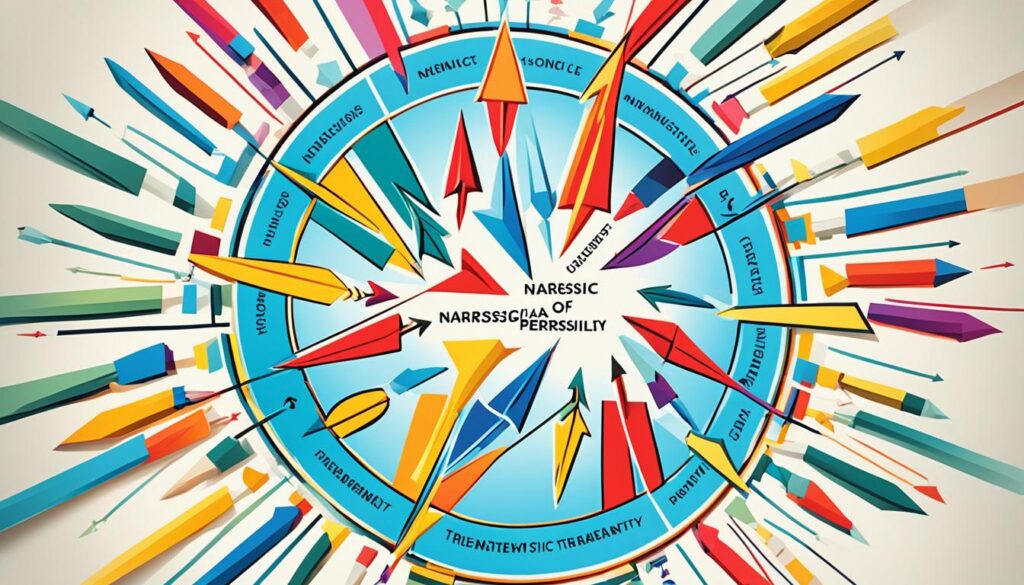Did you know that approximately 6.2% of adults in the United States are estimated to have narcissistic personality disorder?
Living with narcissistic personality disorder can be challenging, both for individuals with the disorder and those around them. It is important to understand the symptoms and impact of this condition in order to navigate relationships and seek appropriate support.
Key Takeaways:
- Narcissistic personality disorder affects approximately 6.2% of adults in the United States.
- Individuals with narcissistic personality disorder have an unreasonably high sense of self-importance and a lack of empathy.
- The disorder can cause difficulties in relationships and may co-occur with other mental health conditions.
- Treatment options for narcissistic personality disorder include talk therapy, but individuals with the disorder may be resistant to seeking help.
- If you recognize aspects of narcissistic personality disorder in yourself or someone you know, it is important to reach out to a healthcare provider or mental health professional for support.
Understanding Narcissism and its Impact on Relationships
Narcissistic personality disorder can significantly affect various aspects of an individual’s life, particularly their relationships. People with this disorder often struggle to maintain fulfilling connections with others due to their deep-rooted narcissism, which manifests in an excessive need for admiration, a lack of empathy, and an expectation of special treatment. These traits can lead to manipulative and selfish behavior, resulting in relationship difficulties and strained interactions with loved ones.
The impact of narcissism on relationships can be detrimental for both parties involved. Individuals with narcissistic personality disorder tend to prioritize their own needs and desires above those of their partners, leading to an imbalance and feelings of neglect. Their constant need for validation and admiration can cause strain and frustration within the relationship, as it becomes increasingly difficult to meet their unrealistic expectations.

“In relationships with individuals who have narcissistic personality disorder, it can feel as though you are constantly walking on eggshells,” explains Dr. Jane Richards, a licensed therapist specializing in personality disorders. “Their lack of empathy and inability to truly understand and consider the feelings of others can be immensely challenging.”
The narcissistic nature of these individuals also leads to an inherent power dynamic within the relationship, where one partner holds the majority of control and authority. This power imbalance can be emotionally draining for the other partner, as their needs and desires are often overshadowed by the constant focus on the narcissist’s self-centeredness.
Furthermore, narcissists are skilled manipulators who excel at charming and seducing their partners initially. This initial phase, known as love-bombing, involves showering their partner with affection, attention, and gifts, creating an illusion of an ideal relationship. However, once the narcissist feels secure in the relationship, they may exhibit a lack of empathy, gaslighting, and emotional manipulation, all intended to maintain their dominance.
It’s common for narcissistic individuals to engage in gaslighting, a manipulative technique where they twist reality to make their partner doubt their own sanity and perceptions. This can have a severe impact on the partner’s self-esteem and overall mental well-being.
In addition to the emotional toll, narcissistic individuals may also exhibit various controlling behaviors, such as isolating their partner from friends and family, monitoring their activities, and dictating their choices. These actions further erode the foundation of trust and independence within the relationship, exacerbating feelings of isolation and entrapment for the partner.
Ultimately, the impact of narcissistic personality disorder on relationships is complex and multifaceted. It is important for individuals in these situations to recognize the signs of narcissism and seek assistance from mental health professionals or support groups. By establishing healthy boundaries, practicing self-care, and seeking help, individuals can protect their emotional well-being and work towards fostering healthier relationships.
Recognizing the Signs of Narcissistic Personality Disorder
Recognizing the signs of narcissistic personality disorder is crucial in understanding and navigating relationships with individuals who exhibit this condition. By being able to identify these signs, we can better comprehend the behaviors and attitudes associated with narcissistic personality disorder.
Some common signs of narcissistic personality disorder include:
- An unreasonably high sense of self-importance
- A constant need for admiration
- Grandiose fantasies
- A sense of superiority
- A lack of empathy
Individuals with narcissistic personality disorder may exhibit arrogant and critical behavior towards others. They might take advantage of those around them and have difficulty recognizing and addressing the needs and feelings of others. These behaviors often contribute to difficulties in establishing and maintaining healthy relationships.
“Narcissistic personality disorder can manifest in various ways, and recognizing the signs is crucial in managing our interactions and emotional well-being.” – Dr. Sarah Williams, Psychologist
It is important to emphasize that the presence of these signs does not guarantee a diagnosis of narcissistic personality disorder. A comprehensive evaluation by a mental health professional is required for an accurate diagnosis. However, being aware of these signs can provide insights into the behaviors and attitudes that may indicate the presence of this disorder.

Understanding the signs of narcissistic personality disorder empowers us to navigate relationships with greater insight, empathy, and emotional well-being.
The Impact of Narcissistic Personality Disorder on Mental Health
In individuals with narcissistic personality disorder, the impact on mental health can be profound. The excessive need for validation and admiration, coupled with a lack of empathy for others, creates a challenging internal landscape that can adversely affect emotional well-being.
Managing emotions and behavior becomes a struggle for those with narcissistic personality disorder, leading to difficulties in handling stress and adapting to change. The constant need for external validation can make individuals vulnerable to feelings of depression and insecurity. There is a persistent fear of being exposed as a failure, as the fragile self-image crumbles under scrutiny.
“Living with narcissistic personality disorder is like living in a constant battle between the inflated self and an underlying vulnerability.”
Moreover, individuals with narcissistic personality disorder may be at an increased risk for developing other mental health conditions. The constant pursuit of validation and admiration can lead to heightened anxiety, while the inability to build genuine connections often results in feelings of loneliness and isolation. Substance abuse may also become a coping mechanism for those seeking an escape from the emotional turmoil.

Effects on Emotional Well-being
The emotional impact of narcissistic personality disorder can be debilitating. Constantly seeking validation and admiration, individuals may experience a rollercoaster of emotions, from grandiosity and exhilaration to devastating levels of self-doubt and worthlessness. The inability to regulate emotions effectively can lead to frequent mood swings and outbursts of anger or frustration.
Increased Vulnerability to Depression and Anxiety
Depression and anxiety often co-occur with narcissistic personality disorder. The fear of failure and the constant need for external validation can contribute to a persistent sense of sadness and hopelessness. Anxiety arises from the fear of being exposed as inadequate and a constant worry about maintaining the desired image of superiority.
Risk of Substance Abuse
The emotional turmoil caused by narcissistic personality disorder can also increase the risk of substance abuse. The desire to escape from the overwhelming emotions and the need for instant gratification can drive individuals to engage in unhealthy coping mechanisms, such as alcohol or drug abuse.
Seeking Support for Mental Well-being
Individuals with narcissistic personality disorder may be resistant to seeking help due to their belief in their own superiority. However, acknowledging the impact of the disorder on mental health is a crucial step towards seeking support and healing.
If you or someone you know is struggling with narcissistic personality disorder, it is important to reach out to a trusted mental health professional. With the right guidance and therapy, individuals can develop healthier coping strategies, address underlying emotional wounds, and improve overall mental well-being.
Remember, seeking help is a sign of strength, leading to greater self-awareness and the potential for personal growth.
Treatment Options for Narcissistic Personality Disorder
Treatment for narcissistic personality disorder typically involves talk therapy, also known as psychotherapy. This type of therapy can help individuals with this disorder gain insight into their behavior and learn healthier ways of relating to others.
During therapy sessions, individuals may be encouraged to explore their thoughts, feelings, and behaviors, and work towards developing more empathy and understanding for others. The goal of treatment is not to eliminate all narcissistic traits, but rather to manage them in a way that promotes healthier relationships and emotional well-being.
One common approach in psychotherapy for narcissistic personality disorder is cognitive-behavioral therapy (CBT). This therapeutic approach helps individuals identify and challenge their distorted and unrealistic thinking patterns, as well as develop healthier coping mechanisms and problem-solving skills.
Another type of therapy that may be beneficial for individuals with narcissistic personality disorder is psychodynamic therapy. This form of therapy focuses on exploring unconscious thoughts and childhood experiences that may have contributed to the development of narcissistic traits. Through this process, individuals can gain a deeper understanding of themselves and work towards personal growth and change.
It is important to note that individuals with narcissistic personality disorder may be resistant to seeking treatment, as they may not see anything wrong with their behavior or may view seeking help as an attack on their self-esteem. However, with the guidance and support of a skilled therapist, individuals with narcissistic personality disorder can make progress towards healthier relationships and improved emotional well-being.
“Therapy provides a safe and non-judgmental space for individuals with narcissistic personality disorder to explore the underlying causes of their behavior and develop healthier ways of relating to others.”
Benefits of Therapy for Narcissistic Personality Disorder:
- Increased self-awareness and understanding of one’s own behavior
- Improved ability to empathize with others
- Enhanced communication and relationship skills
- Development of healthy coping mechanisms
- Reduced emotional reactivity
Types of Therapy for Narcissistic Personality Disorder
| Therapy Approach | Description |
|---|---|
| Cognitive-Behavioral Therapy (CBT) | Focuses on identifying and challenging distorted thinking patterns and developing healthier coping mechanisms. |
| Psychodynamic Therapy | Explores unconscious thoughts and childhood experiences to gain insight into the development of narcissistic traits. |
| Group Therapy | Provides support and feedback from peers who have similar experiences, fostering personal growth and relationship improvement. |

The Causes and Risk Factors of Narcissistic Personality Disorder
Understanding the causes of narcissistic personality disorder can provide valuable insights into this complex mental health condition. While the exact cause of narcissistic personality disorder remains unknown, research suggests that a combination of genetic, environmental, and neurobiological factors contribute to its development.
One potential risk factor for developing narcissistic personality disorder is the influence of parenting styles. Overprotective parenting or neglectful parenting can both play a role in the development of this disorder. Overprotective parenting may lead to excessive pampering and the reinforcement of an inflated sense of self, while neglectful parenting can result in a lack of emotional support and validation.
Genetics also play a role in the development of narcissistic personality disorder. Studies have shown that individuals with a family history of the disorder are more likely to develop it themselves. However, it is important to note that genetics alone do not determine the development of narcissistic personality disorder, and not everyone with a family history of the disorder will develop it.
Personality traits can also contribute to the risk of developing narcissistic personality disorder. Certain personality traits, such as having an excessive need for admiration, a sense of entitlement, or a lack of empathy, can increase the likelihood of developing this disorder.
It’s important to remember that the presence of these risk factors does not guarantee the development of narcissistic personality disorder. Many individuals may possess these risk factors but do not manifest the disorder. Additional research is needed to fully understand the complexities of narcissistic personality disorder and its causes.

By gaining a deeper understanding of the causes and risk factors of narcissistic personality disorder, we can enhance our comprehension of this complex condition and work towards more effective prevention and treatment strategies.
Complications and Co-Occurring Conditions of Narcissistic Personality Disorder
Narcissistic personality disorder can have significant complications and may co-occur with other mental health conditions. It is essential to address these challenges and seek appropriate treatment to enhance overall well-being.
Complications of Narcissistic Personality Disorder
The complications of narcissistic personality disorder can impact various aspects of an individual’s life, including relationships, work or school, mental health, and physical well-being. Here are some common complications associated with this disorder:
| Complications | Descriptions |
|---|---|
| Difficulties in Relationships | Individuals with narcissistic personality disorder often struggle to maintain healthy and fulfilling relationships. Their excessive need for admiration, lack of empathy, and manipulative behavior can strain interpersonal connections. |
| Problems at Work or School | Individuals with narcissistic personality disorder may struggle with authority, teamwork, and criticism, leading to conflicts and difficulties in a professional or academic setting. |
| Depression and Anxiety | Narcissistic personality disorder can contribute to feelings of depression and anxiety. Individuals may experience low self-esteem, fear of failure, and challenges managing their emotions. |
| Other Personality Disorders | Narcissistic personality disorder can co-occur with other personality disorders, such as borderline personality disorder or antisocial personality disorder. These overlapping conditions can complicate diagnosis and treatment. |
| Eating Disorders | Unhealthy preoccupations with body image, appearance, and self-image can lead to the development of eating disorders in individuals with narcissistic personality disorder. |
| Physical Health Problems | Chronic stress, poor self-care, and risky behaviors associated with narcissistic personality disorder can contribute to physical health problems, such as cardiovascular issues or substance abuse-related conditions. |
| Drug or Alcohol Misuse | Some individuals with narcissistic personality disorder may turn to substance abuse as a coping mechanism or to enhance their sense of superiority or pleasure. |
Recognizing and addressing these complications is crucial to improving the overall well-being of individuals with narcissistic personality disorder. Seeking appropriate treatment and support can help manage the complexities of this disorder and promote healthier outcomes.

When to Seek Help for Narcissistic Personality Disorder
People with narcissistic personality disorder may be resistant to seeking help and may not recognize that anything is wrong. However, if you recognize aspects of narcissistic personality disorder in yourself or are feeling overwhelmed by sadness or other negative emotions, it is important to reach out to a trusted healthcare provider or mental health professional. Proper diagnosis and treatment can help improve relationships, manage symptoms, and enhance overall quality of life.
If you suspect that you or someone you know may be struggling with narcissistic personality disorder, seeking professional help is crucial. A healthcare provider or mental health professional can offer guidance, support, and specialized treatment options to address the unique challenges associated with this disorder.
It is imperative to remember that reaching out for help is not a sign of weakness, but an act of courage and self-care. By seeking assistance, you are taking an important step towards understanding yourself better, fostering healthier relationships, and promoting personal growth.
Knowing When to Seek Help
While there are no specific criteria for determining when to seek help for narcissistic personality disorder, there are some indicators that may suggest the need for professional intervention:
- Consistently feeling a lack of fulfillment in relationships.
- Experiencing difficulties with empathy and connecting with others.
- Engaging in manipulative behaviors or seeking constant admiration.
- Experiencing a persistent sense of entitlement and superiority.
- Struggling with intense emotions such as anger, sadness, or insecurities.
Remember, seeking help is not a sign of weakness, but a courageous step towards personal growth and well-being. Whether you are personally affected by narcissistic personality disorder or supporting someone who is, professional guidance can make a significant difference in navigating the challenges and fostering positive change.

| Signs that may indicate the need for professional help | Positive steps towards seeking help |
|---|---|
| Consistently feeling a lack of fulfillment in relationships | Reach out to a trusted healthcare provider or mental health professional |
| Experiencing difficulties with empathy and connecting with others | Seek guidance, support, and specialized treatment options |
| Engaging in manipulative behaviors or seeking constant admiration | Understand that seeking assistance is an act of courage and self-care |
| Experiencing a persistent sense of entitlement and superiority | Take an important step towards understanding yourself better |
| Struggling with intense emotions such as anger, sadness, or insecurities | Promote personal growth and foster healthier relationships |
The Impact of Narcissistic Personality Disorder on Others
Narcissistic personality disorder can have a significant impact on those around the individual with the disorder. People in relationships with someone with narcissistic personality disorder may experience emotional manipulation, lack of empathy, and devaluation. They may also be subject to constant criticism and unrealistic expectations. Understanding the impact of narcissistic personality disorder on others can help individuals in these relationships set boundaries and seek support.
“Living with someone who has narcissistic personality disorder can be incredibly challenging. Their constant need for admiration and lack of empathy can leave you feeling emotionally drained and devalued. It’s important to remember that their behavior is not a reflection of your worth. Setting boundaries and seeking support can help you navigate the difficulties of this relationship.”
Being in a relationship with someone who has narcissistic personality disorder can take a toll on your mental and emotional well-being. The emotional manipulation and constant criticism can erode self-esteem and lead to feelings of worthlessness. It’s essential to recognize the impact of narcissistic personality disorder on your own mental health and seek support when needed.
“If you’re in a relationship with someone who exhibits the signs of narcissistic personality disorder, it’s important to prioritize your well-being. Seeking therapy or joining support groups can provide you with the necessary tools to navigate the challenges of this relationship and take care of yourself.”
Additionally, the impact of narcissistic personality disorder extends beyond personal relationships. In professional settings, individuals with this disorder may display an inflated sense of self-importance and disregard for others’ contributions. This can lead to a toxic work environment and strained interactions with colleagues and superiors.
“If you’re dealing with a coworker or supervisor with narcissistic personality disorder, it’s crucial to establish clear boundaries and seek support from your HR department or a trusted mentor. Remember that their behavior is not a reflection of your professional abilities or worth.”
Key Points:
- Narcissistic personality disorder affects those in relationships with individuals with the disorder.
- Emotional manipulation, lack of empathy, and constant criticism are common experiences.
- Understanding the impact can help individuals set boundaries and seek support.
- Narcissistic personality disorder can also affect professional relationships and create a toxic work environment.
- Setting boundaries and seeking support in professional settings are essential.

Overall, the impact of narcissistic personality disorder on others is significant and can have long-lasting effects. It’s essential for individuals in relationships with someone with this disorder to prioritize their well-being, set boundaries, and seek support. Recognizing the impact in professional settings is also critical to maintaining a healthy work environment. By understanding the effects of narcissistic personality disorder, we can better navigate these challenging relationships and protect our own mental and emotional well-being.
Conclusion
Narcissistic personality disorder is a complex mental health condition that can have significant implications for individuals and their relationships. The symptoms of this disorder, including an unreasonably high sense of self-importance, a need for constant admiration, a lack of empathy, and a belief in one’s own superiority, can create challenges in personal and professional contexts.
While treatment options are available, it is important to note that individuals with narcissistic personality disorder may be resistant to seeking help. This resistance can be attributed to their inability to recognize or acknowledge their own behavior as problematic. However, recognizing the signs of narcissistic personality disorder is crucial in order to address and manage the impact it has on both the individual and their relationships.
By seeking appropriate support, such as therapy or counseling, individuals with narcissistic personality disorder can work towards improving their relationships and overall well-being. Additionally, loved ones and those affected by someone with this disorder can benefit from setting boundaries and seeking support for themselves.
In conclusion, although narcissistic personality disorder presents unique challenges, it is possible to navigate its complexities and find ways to cultivate healthier relationships and enhance overall well-being. Through increased awareness, understanding, and support, individuals affected by this disorder can embark on a journey of personal growth and improved interpersonal connections.
FAQ
What are the symptoms of narcissistic personality disorder?
The symptoms of narcissistic personality disorder include an unreasonably high sense of self-importance, the need for constant admiration, a belief in their own superiority, preoccupation with fantasies of success and power, and a lack of empathy.
How does narcissistic personality disorder affect relationships?
Narcissistic personality disorder can cause difficulties in maintaining fulfilling relationships due to excessive need for admiration, lack of empathy, and expectation of special treatment. It can lead to manipulative and selfish behavior, resulting in relationship difficulties and strained interactions.
How can I recognize the signs of narcissistic personality disorder?
Some common signs of narcissistic personality disorder include an unreasonably high sense of self-importance, a need for constant admiration, grandiose fantasies, a sense of superiority, and a lack of empathy. Arrogant and critical behavior, taking advantage of others, and difficulty recognizing and addressing the needs and feelings of others are also signs to look out for.
How does narcissistic personality disorder impact mental health?
Narcissistic personality disorder can have a significant impact on an individual’s mental health. It can lead to difficulties in managing emotions and behavior, experiencing stress and adapting to change. Feelings of depression, insecurity, and fear of failure may also be present. Individuals with narcissistic personality disorder may also be at an increased risk for developing other mental health conditions such as depression, anxiety, and substance abuse.
What are the treatment options for narcissistic personality disorder?
Treatment for narcissistic personality disorder typically involves talk therapy or psychotherapy. This type of therapy can help individuals gain insight into their behavior and learn healthier ways of relating to others. However, it is important to note that individuals with narcissistic personality disorder may be resistant to seeking treatment.
What causes narcissistic personality disorder?
The exact cause of narcissistic personality disorder is unknown, but it is believed to be a complex combination of genetic, environmental, and neurobiological factors. Some potential risk factors include overprotective or neglectful parenting, genetics, and certain personality traits. It is important to note that not all individuals with these risk factors will develop narcissistic personality disorder.
What are the complications and co-occurring conditions of narcissistic personality disorder?
Complications of narcissistic personality disorder can include difficulties in relationships, problems at work or school, depression, anxiety, other personality disorders, eating disorders, physical health problems, and drug or alcohol misuse. It is important to address these potential complications and seek appropriate treatment to improve overall well-being.
When should I seek help for narcissistic personality disorder?
If you recognize aspects of narcissistic personality disorder in yourself or are feeling overwhelmed by negative emotions, it is important to reach out to a trusted healthcare provider or mental health professional. Early diagnosis and treatment can help improve relationships, manage symptoms, and enhance overall quality of life.
How does narcissistic personality disorder impact others?
Narcissistic personality disorder can have a significant impact on those around the individual with the disorder. People in relationships with someone with narcissistic personality disorder may experience emotional manipulation, lack of empathy, constant criticism, and unrealistic expectations. Understanding the impact of narcissistic personality disorder on others can help individuals in these relationships set boundaries and seek support.
Can you provide a conclusion on narcissistic personality disorder symptoms?
Narcissistic personality disorder is a complex mental health condition that can have a profound impact on individuals and their relationships. Recognizing the symptoms, seeking appropriate support, and understanding its impact on mental health and others are crucial steps towards managing this disorder and improving overall well-being.
Our Content Strategist, Jordan, has a knack for deciphering the digital landscape to determine what our audience seeks. With a foundation in behavioral science and digital marketing, Jordan crafts our content strategy, ensuring that our topics are relevant, research-based, and resonant. Their strategic approach helps Narcissistic Man reach hearts and minds across the globe.











